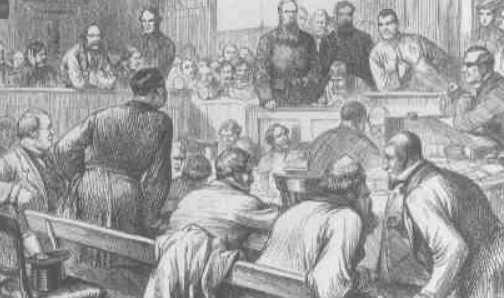
The Turf Fraud Scandal of 1877, also known as the Trial of the Detectives, involved four senior Scotland Yard detectives who took bribes from five men convicted of fraud and forgery.[1] The case is also known as the De Concourt frauds, after Madame de Concourt, who suffered the heaviest losses.[2]
Three of the detectives involved were tried and convicted of perverting the course of justice at Bow Street Police Court in July 1877; the fourth was acquitted.[3] Their convictions resulted in the formation of the Metropolitan Police’s Criminal Investigation Department (CID), initially comprising about 250 officers out of a force of just under 10,000 men.[4]
Fraud
The fraud was perpetrated by the confidence tricksters William Kurr, Harry Benson, Frederick Kurr, Charles Bale and Edwin Murray.[3] They published a fake newspaper called The Sport, which contained an article claiming that English bookmakers would not give fair odds to those known to be skilled in horse racing. The paper was translated into French and sent to various individuals in France, along with a suggestion that those interested in profiting from the skill of those English tipsters should send a cheque to Mr Montgomery, who in return for a small commission would discreetly place the bets on behalf of his foreign clients.[5]
One of those taken in by the scam was the Parisian Madame de Concourt, who sent £10,000, equivalent to about £1.2 million as at 2023,[a]Calculated using the retail price index.[6] to a “sworn bookmaker”, T. Ellerton. She was then informed that in order to retain her winnings, according to the laws of England, she must remit a further £1,200. To raise the cash she had to consult with her legal adviser, who became suspicious and contacted the London police. Their investigation led to the conviction of all five of the fraudsters on 23 April 1873: Benson to 15 years penal servitude, William and Frederick Kurr and Charles Bale to 10 years penal servitude, and Edwin Murray to 18 months hard labour.[7]
Subsequent investigation
Benson and Kurr had always seemed to be one step ahead of the arresting officers, as they were bribing senior Metropolitan Police officers for advance warning of their impending arrest.[4]
The detectives William Palmer, Nathaniel Druscovich and John Meiklejohn were tried at Bow Street Police Court in 1877; the fourth detective involved, Chief Inspector George Clarke, was acquitted. They were found guilty of perverting the course of justice, along with a solicitor named Edward Froggatt, and were sentenced to two years in prison.[2]
